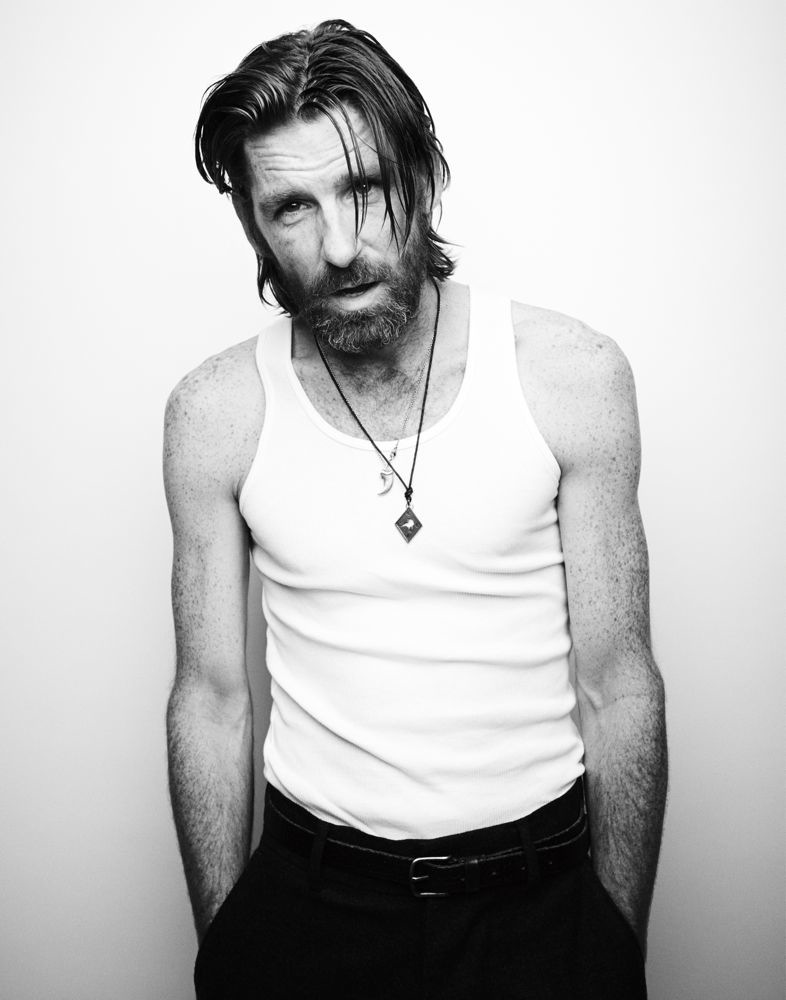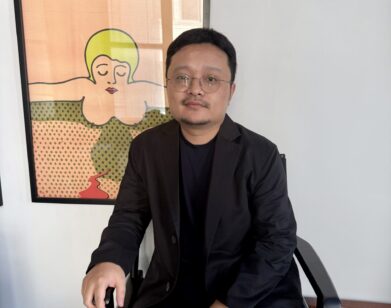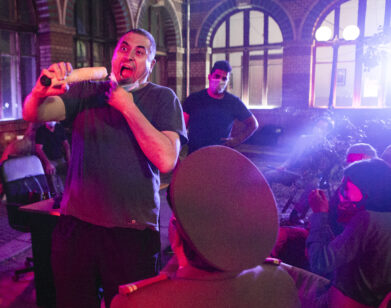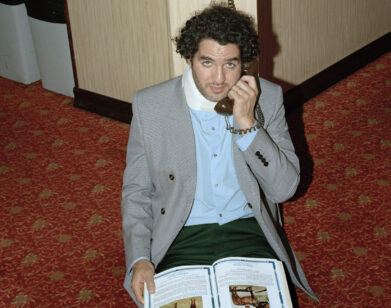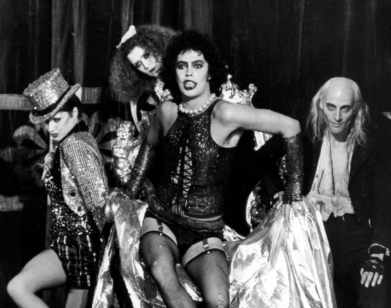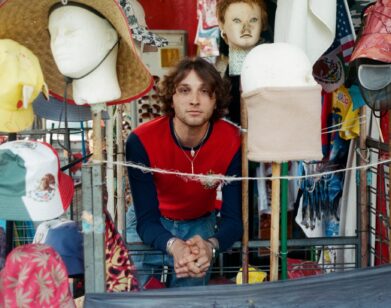Paul Anderson and Team Arthur
PAUL ANDERSON IN LONDON, SEPTEMBER 2015. PHOTOS: MATT HOLYOAK/KAYTE ELLIS AGENCY. STYLING: NIC JOTTKANDT. GROOMING: LARRY KING FOR STREETERS.
As the protagonists of Steven Knight‘s Birmingham-set television drama Peaky Blinders, the Shelby siblings haven’t had it easy. Tommy (Cillian Murphy), the second brother in age and the first in everything else, drowns his World War One shell shock with opium. His younger brother John (Joe Cole) is trying to raise his young children following the death of his wife. Ada (Sophie Rundle), the only sister, defies her brothers and marries local communist Freddie Thorne only to have him die unceremoniously between seasons. Finn, the last of the lot, is too young to be a part of the Shelby brotherhood yet remains at risk from their enemies. Then there is Arthur, played by Kennington, South London native Paul Anderson. As the eldest sibling, Arthur should be the patriarch, but he’s not, because Tommy got all the family smarts and Arthur got all the family rage. While he might not be smoking opium, he does plenty of self-medicating with whisky, cocaine, and visceral violence. By the end of the show’s first two seasons, Arthur has accidentally killed a young man in the boxing ring, tried to hang himself, and almost been murdered by Jewish gangster Alfie Solomons (Tom Hardy). Occasionally, however, Arthur channels his energy more productively as Tommy’s right-hand man. When he does, it’s infectious; he’s Arthur fooking Shelby, the sort of character that inspires YouTube supercuts. And because you never know quite where he’s going to fall, there is a certain audience affection reserved only for Arthur. As one YouTube commentor writes, “The actor playing Arthur does a great job at making him really likeable even when he’s doing dumb shit.”
Until about seven years ago, Paul Anderson wasn’t an actor at all; he was a ticket scalper. “I loved it. A wealth of experience,” he recalls in his thick South London accent. “I earned a lot of money out of it, but that was all I got out of it. Artistically, there was nothing in that for me, so I’d always wanted to do something else.” Anderson did not, however, want to be an actor; “I always wanted to be a frontman in a band,” he says. “Not a footballer. Not an actor. Certainly not a policeman or a fireman. I wanted to be a lead singer. Nothing else,” he continues.
In less than a decade, Anderson’s career has accelerated quickly. He attended drama school, made his London theatrical debut, and started landing roles in London geezer flicks like The Firm, Piggy, and The Sweeney. He began working with more high profile directors such as Brian De Palma (Passion), Guy Ritchie (Sherlock Holmes: A Game of Shadows), and, of course, Peaky Blinders showrunner Steven Knight and director Otto Bathurst. Before 2015 comes to a close, Anderson will appear in three more films: Alejandro González Iñárritu‘s The Revenant; Ron Howard’s In the Heart of the Sea; and Universal’s Kray twins biopic Legend, which just showed at the Toronto International Film Festival and has pushed its U.S. release from last week to a more Oscar-friendly date in November;. Each film features at least one fellow Peaky Blinders alum; Tom Hardy is in both The Revenant and Legend, and Cillian Murphy and Hardy’s wife Charlotte Riley appear in In the Heart of the Sea.
When we talk to Anderson over the phone at the end of August, he is walking his dog Ray, a part-Poodle, part-Westie mutt, in Primrose Hill. “He’s my little mate,” he says. “He’s the best ever.”
EMMA BROWN: How did you start acting?
PAUL ANDERSON: I was inspired to attend drama school, so that’s what I’ve done. I went to Webber Douglas. I’d a great time there. It was like going back to school for me. I left school very young; I left school when I was about 14, 15, so there was a large gap in my education. Going to drama school was like university that I never had.
BROWN: What inspired you to go to drama school?
ANDERSON: A friend of mine. I was having dinner one night with a bunch of friends and one of them was an actor at the table. I was reciting lines from my favorite movie, which is The Warriors, a 1979 Walter Hill film about gangs in New York. I can recite the film word-for-word—people can’t watch it with me ’cause I drive them mad. This girl I was seeing at the time, she said, “Have you ever thought about acting?” People have always said that to me: “Oh, you’re funny. Have you ever thought about doing something?” I just thought, “Well, if anything like that is going to happen, it’ll just happen. I certainly won’t need to go to drama school”—I never thought about attending drama school. Then one day I got these application forms and I filled them out. I applied to the Guildhall and Webber Douglas. I got into both of the schools. That was it.
BROWN: What was your first professional acting job?
ANDERSON: I left drama school slightly early to do a play at the Royal Court. It was written by Gregory Burke, whose film I just did—his first movie ‘71. Gregory’s an amazing writer. It was my first job and I met him fresh from drama school—I hadn’t even graduated—and we’ve remained friends ever since. He always said to me, “One day, I’m going to write a movie”—because he’s written quite a few plays—”and I really hope you can do it.” It’s strange because that was years later, ’71.
BROWN: What was The Revenant like?
ANDERSON: It was a great experience, first and foremost. The movie was supposed to be three months long; it went on for seven months. We spent about four, five months in Canada, in a lovely part of the world called Calgary. And Alejandro, is, without a doubt, one of the best directors I’ve ever worked with, and the reason I say that is because I was fortunate enough to see some of the movie—he showed Tom and me 15 minutes of the film. It was a way of thanking us, or of saying to us, “Look, the hard work, this is what it’s been about.” We watched it and honestly, Tom and I, we just looked at each other and were like, “Looks good. Seriously does look good”
BROWN: Did you know Tom before Peaky Blinders?
ANDERSON: No. We met on Peaky Blinders. We met on a scene between his character and mine. We have a mutual friend Noomi Rapace, and she’s often said, “You should meet Tommy. You and he would get on.” So I’d heard about him and likewise he’d heard the same about me. So we met on the set of Peaky, and we didn’t really speak to each other before the scene. I think we became friends in the scene. We played around and we ad-libbed and surprised each other slightly with some of the improv that we were doing. I instantly just fell in love with him, basically, is the short of it. And he felt the same way and we’ve remained friends ever since. We then went to do Legend. He said to me he was doing this movie, this gangster film, and then he sent me the script. At first I wasn’t sure about doing it, then I met [the director] Brian [Helgeland]. We sat down for coffee, and Brian’s passion and enthusiasm for the movie and the role had done it for me really.
BROWN: How did you get cast in The Revenant?
ANDERSON: Tom said to me—we had this love affair going, we spent every day with each other for six months—”Look, I’m going to Canada. I’m doing this movie The Revenant. I don’t know what’s in it for you, but surely there’s got to be something.” I spoke to my agent and was like, “What’s happening with The Revenant?” Most of the major roles had been cast, but having known Alejandro [González Iñárritu] and also Tom, I was like, “Look, even if it’s a lesser role, I don’t mind because this is something I really want to do and be a part of.” Alejandro and I skyped, we got on very well, and he offered me the role.
BROWN: Your character in Legend, Albert Donaghue, is a real person. Did you get to meet him?
ANDERSON: He is. I believe he’s in a seaside town somewhere in the North of England. I don’t think he’s very well; apparently he’s in ill health. But I didn’t meet him. I didn’t have the chance to meet him, which was a shame, but at the same time I understood the script, and I know a lot from personal experience about East London gangsters. Having grown up in a council estate myself, I’d seen a lot of those characters; my mum worked in a pub, she was a barmaid, and so I knew a lot of those ’60s gangster sort of characters. It wasn’t that hard for me to replicate that kind of man on screen and the vernacular and the vocabulary is something I’m very familiar with. By no means am I a gangster, but it was something that was easy to get in touch with. That was one of my reservations about the movie initially. Legend isn’t a London geezer flick, and that’s due to Brian’s directing and obviously Tom and the cast—he moved well away from that kind of genre of film—but initially I was like, “This doesn’t really interest me because I know this world and I know those characters.” But I had a different take on it. I thought I’d do something funny with my voice, and I based Albert Donaghue on a friend of mine that I know who sells tickets. I used his voice. My voice is slightly distorted in Legend. I sound like an old man.
BROWN: Did you tell him?
ANDERSON: Yeah, he did find out. My brother told him.
BROWN: What was his reaction?
ANDERSON: He’s was very flattered. He’s a lovely guy and a big fan and supporter of what I do. He also found it very funny that I was mimicking him.
BROWN: Tell me about In the Heart of the Sea with Cillian [Murphy].
ANDERSON: We’re very different from Tommy and Arthur Shelby. We used to laugh about it. We’d be on this boat in the middle of the Atlantic Ocean and we’d talk in our Birmingham accents just for a second between takes. He would shout, “Arthur!” and I’d go, “Tommy! What the bloody hell are we doing here?” I love Cillian. He’s a real friend. But that movie was really tough. I found that film extremely difficult.
BROWN: Just because you were stuck on a boat in the middle of the sea?
ANDERSON: Yeah. When we got to the Canary Islands where we finished the movie, sometimes we’d spend 12 hours out at sea, and that went on for a week or two, and that was pretty tough—five am call into makeup and straight on a ship. It was a big enough ship but it was tight conditions and sometimes it was very hard. Don’t get me wrong, I’m an actor, I don’t dig roads for a living—it’s a luxury. But then there was weight loss involved, so a lot of us were starving hungry. We couldn’t eat because our characters we stranded at sea, and in the book they looked a lot worse than we do in the movie, but we managed to get to that state and that appearance by dieting. That made it hard: when you’re hungry and you’re on a boat all day and you can’t eat a jam doughnut, yet jam doughnuts are floating past you on trays for the crewmembers. As discreet as they were, we all knew that there were jam doughnuts on board. All we could eat was a handful of nuts and a boiled egg.
BROWN: I wanted to talk about Peaky Blinders. Arthur had a really tough second season and at times it didn’t seem like he was going to make it. Were you given Arthur’s entire arc before you started filming? Did you ever worry he’d be killed off?
ANDERSON: Yeah. We’re fed the scripts maybe two, three at a time. On our journeys to Liverpool, Birmingham, or Manchester where we shoot, Joe Cole and I have this conversation about who’s going to die. We’re convinced that it’s either me or him. We go through the cast and it always comes back to that it’s probably going to be me, and he goes, “No, no. It will be John.” It’s quite nice actually, because we have no idea what Steven’s going to do, and Steven never does what we think he’s going to do. Last season, we never saw that whole thing with Sam Neill and Polly coming. I was actually convinced that Arthur was going to get killed in Season Two because he’d left such a trail of destruction behind him.
BROWN: I felt so bad for him. I like Arthur so much.
ANDERSON: People do like him, actually. I’m really surprised. Lots of people like the show, and I get that, but lots of people say, “We love Arthur,” and I don’t know why. I guess I do understand. The thing I love about him and why I like playing him is he’s not just this one-dimensional; he’s tough and he can be violent and brutal, but he’s not just that. He’s got this inner turmoil, this dichotomy: “I don’t want to do this but I’m doing it because it’s my life and it’s the way things are.” In Season Three, from what I’ve read so far, there’s even more of that in there. He’s not turning over a new leaf and being a god-fearing, pious, nice man; he’s still suffering.
BROWN: Does he get his rage under control a bit?
ANDERSON: He slightly controls it, but only slightly. He’s not drinking as much, and that has a lot to do with it.
BROWN: You mentioned earlier that you weren’t always sure you wanted to do Legend. When you get a script and you’re unsure about the part, is there someone you show it to for a second opinion?
ANDERSON: My brother.
BROWN: Is he older or younger?
ANDERSON: He’s older than me and he has a big say in what I do and what’s good and what’s not. Sometimes he has too much of a say in it, but that’s fine, he’s being a caring brother. I always do send him my scripts and ask for his opinion, as long as it may be. He can go on sometimes.
BROWN: Do you disagree or do you generally have the same taste?
ANDERSON: We agree. We have the same taste. He gives me his direct, candid opinion. Sometimes he puts it into perspective. It’s important the things you say yes to and the things you say no to, and I find that those choices and more and more important now.
BROWN: Does he give you the same direct opinion about your performances?
ANDERSON: Yeah, he does. He knows me really well, so he’ll just be brutally honest. There are times when I do something and I automatically think, “He’s not going to like it. He’s going to tell me to do it like this or like that.” My brother’s very opinionated; he’s a frustrated artist himself. He will give me these crazy acting notes on stuff that I’ve done. But I get pleasantly surprised because I think he’s not going to like something, and then he calls me and he says, “I saw that and I think it’s great.”
LEGEND COMES OUT NOVEMBER 20, IN THE HEART OF THE SEA COMES OUT DECEMBER 11, AND THE REVENANT WILL BE OUT IN LIMITED RELEASE ON DECEMBER 25 AND WIDE RELEASE JANUARY 8, 2016. SEASON THREE OF PEAKY BLINDERS IS ALSO DUE OUT IN 2016.

